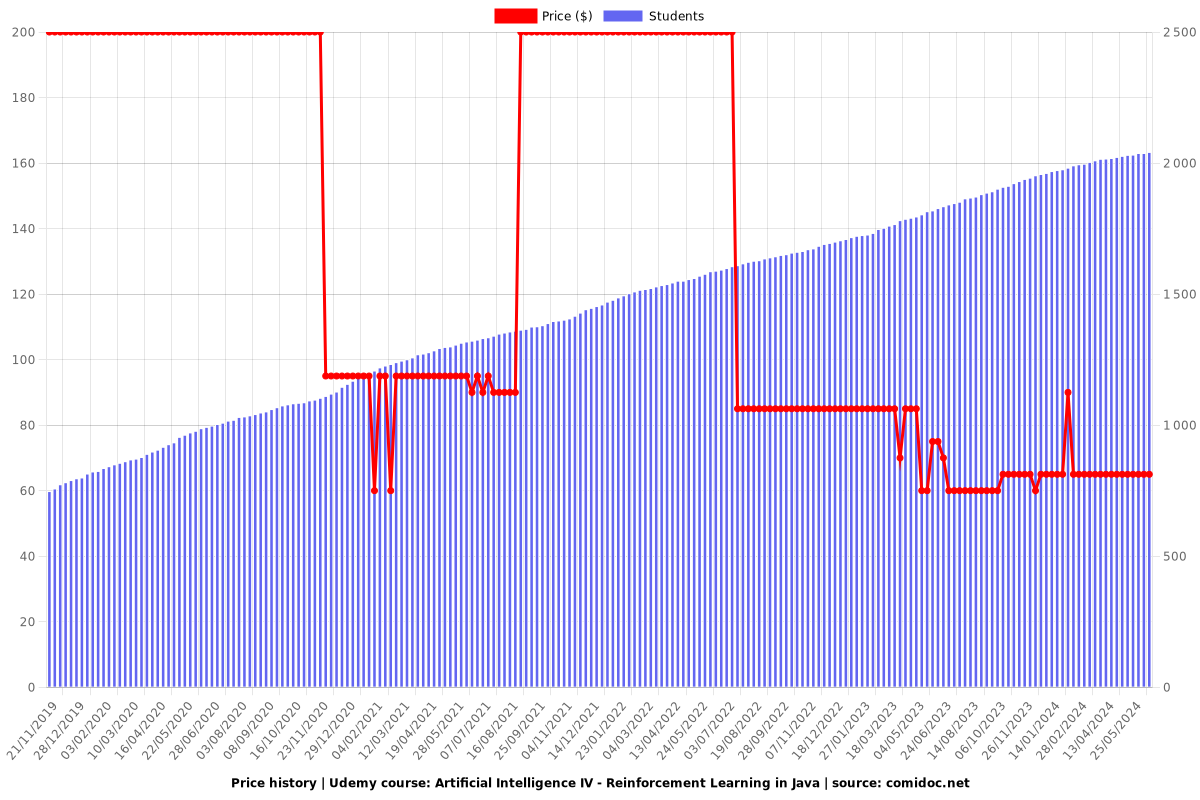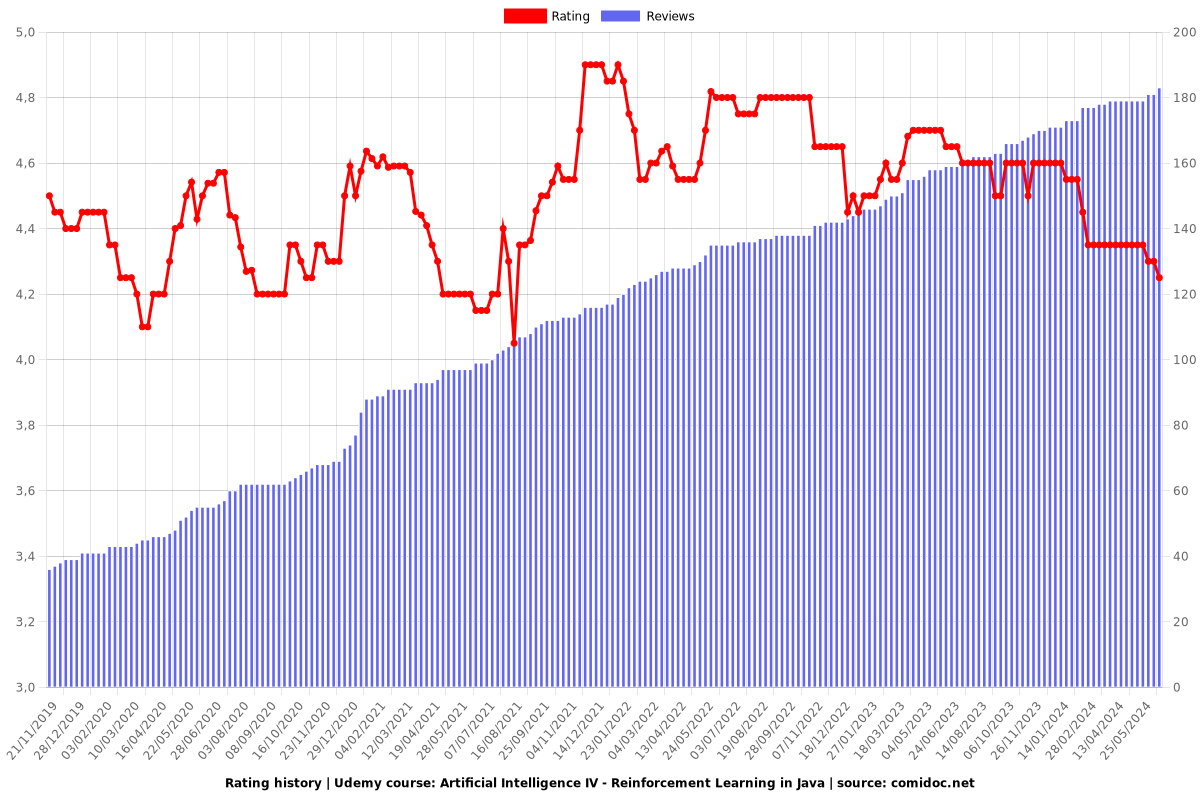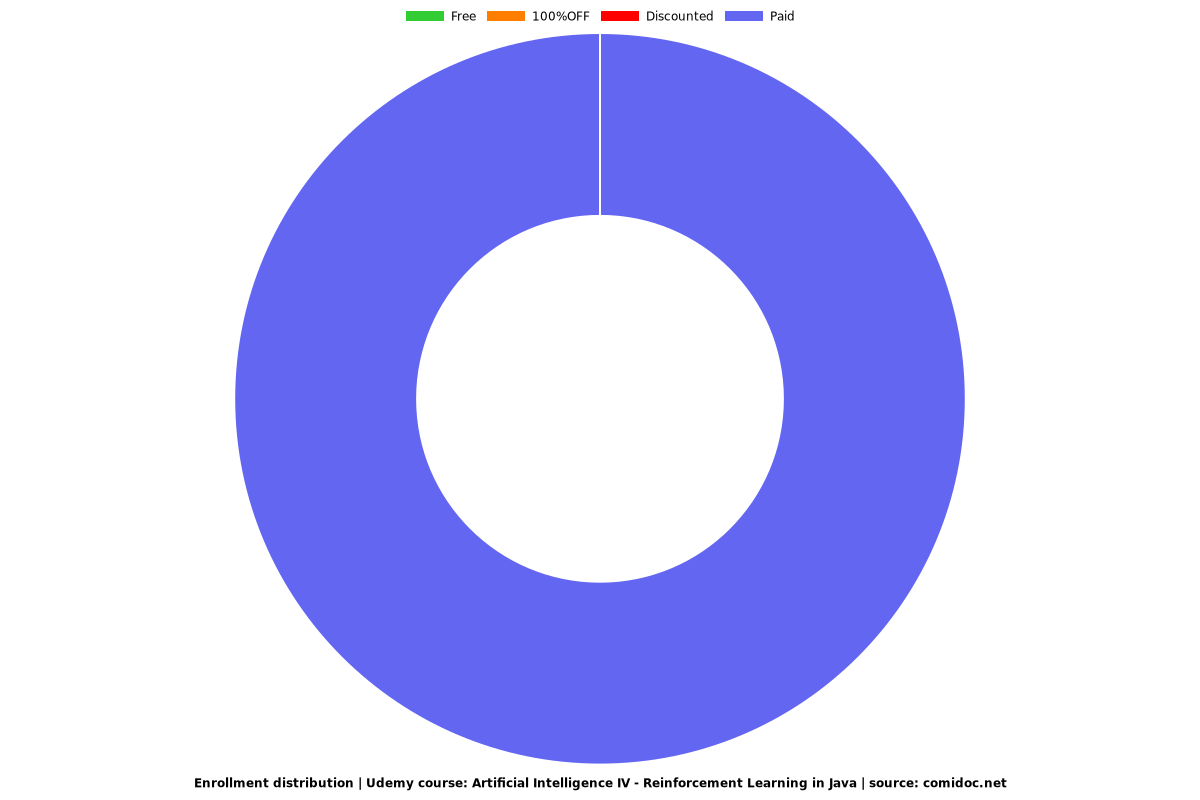Artificial Intelligence IV - Reinforcement Learning in Java
All you need to know about Markov Decision processes, value- and policy-iteation as well as about Q learning approach
4.35 (179 reviews)

2,031
students
3 hours
content
Nov 2023
last update
$64.99
regular price
What you will learn
Understand reinforcement learning
Understand Markov Decision Processes
Understand value- and policy-iteration
Understand Q-learning approach and it's applications
Why take this course?
---
**Course Title:** Artificial Intelligence IV - Reinforcement Learning in Java
**Course Headline:** Master the Art of Decision Making with Markov Decision Processes, Value & Policy Iteration, and Q-Learning in Java! 🚀
**Course Description:**
Embark on a comprehensive journey into the world of Reinforcement Learning with our "Artificial Intelligence IV - Reinforcement Learning in Java" course. This advanced program is meticulously designed for learners who aspire to delve deep into the realm of AI, focusing specifically on the intricacies and applications of Reinforcement Learning (RL) using the Java programming language.
**What You'll Learn:**
🚀 **Mathematical Foundations of RL:**
- Understanding Markov Decision Processes as a cornerstone model in RL.
- Exploring the theoretical underpinnings that enable agents to learn from interaction with their environment.
📚 **Solving Problems with Three Core Methods:**
- **Value Iteration:** Learn how to calculate the optimal value function for each state.
- **Policy Iteration:** Discover the method to find the optimal policy directly.
- **Q-Learning:** Dive into the state-of-the-art model-free approach that learns the optimal policy by interacting with the environment, without relying on a model of the environment.
🤖 **Hands-On with RL Algorithms:**
- **Markov Decision Processes (MDPs):** Gain insights into how MDPs are used to model RL problems.
- **Value & Policy Iteration:** Understand the iterative methods that converge to optimal solutions in RL scenarios.
- **Q-Learning Fundamentals:** Grasp the core principles behind Q-learning and its application in solving complex decision-making tasks.
- **Pathfinding Algorithms with Q-Learning:** Combine Q-learning with classic pathfinding algorithms to navigate environments more efficiently.
- **Q-Learning with Neural Networks (Deep Q-Networks):** Explore the advanced techniques that involve neural networks to approximate the Q-value function, enhancing the learning capabilities of RL agents.
**Why This Course?**
- **Expert-Led Learning:** Learn from Holczer Balazs, a seasoned instructor with extensive experience in AI and a passion for teaching.
- **Real-World Applications:** Apply your newfound knowledge to solve practical problems using Java.
- **Interactive Content:** Engage with interactive coding exercises that solidify your understanding of RL concepts.
- **Community Support:** Join a community of like-minded learners and exchange ideas, solutions, and encourage each other's growth.
**Course Outline:**
1. **Markov Decision Processes (MDPs):**
- Understanding states, actions, and rewards in RL contexts.
- Modeling complex decision-making problems using MDPs.
2. **Value Iteration & Policy Iteration:**
- Learning how to calculate the optimal policy and value function iteratively.
- Applying these methods in Java for practical problem-solving.
3. **Q-Learning Fundamentals:**
- The basics of Q-learning and its significance in RL.
- How Q-learning differs from other RL approaches.
4. **Pathfinding Algorithms with Q-Learning:**
- Integrating pathfinding algorithms like A* or Dijkstra's algorithm with Q-learning for improved performance.
- Practical examples and Java implementations.
5. **Q-Learning with Neural Networks:**
- Introduction to neural networks in the context of RL.
- How to use neural networks to approximate Q-values, leading to more powerful and adaptive learning agents.
By the end of this course, you'll not only understand the theoretical aspects of Reinforcement Learning but also be able to implement them effectively in Java applications. Whether you're looking to advance your career in AI development or simply satisfy your curiosity about one of the most exciting fields in computer science, this course is your stepping stone to mastery in Reinforcement Learning. 🌟
Enroll now and transform your approach to problem-solving with the power of AI and Java! 🖥️➡️🚀
Our review
---
**Overall Course Rating:** 4.35/5
**Course Review Synthesis**
**Pros:**
- **Clear Explanations:** The author provides simple and easy-to-understand explanations on a complex topic, making it an excellent introductory course on Q-Learning.
- **Comprehensive Content:** The course covers the subject in depth, offering a deep dive into reinforcement learning with a focus on Deep Q-Learning.
- **Educational Approach:** The content is well thought out, which is evident from the positive feedback regarding its thoroughness and detailed approach.
- **Positive Reception:** Most recent reviews are positive, indicating that the course is well-received by students for its clarity and depth of coverage.
**Cons:**
- **Lack of Code Implementation:** There is no code implementation provided for Deep Q-Learning, which is a significant aspect of the course content. Instead, there's a single hard-coded example that doesn't utilize deep learning libraries.
- **Interaction and Practical Application:** Some reviewers feel the course lacks practical experiments and more hands-on elements such as homework assignments and quizzes to reinforce learning.
- **Course Content Discrepancies:** There are expectations based on the course description that were not fully met; for example, some anticipated coverage of topics like non-stationary cases, deeper Q-Learning implementation, and advanced strategies like UCB and Thompson Sampling, which were not included or explained.
- **Missing Physical Examples:** The lack of a physical example of Deep Q-Learning, particularly in comparison to other courses from the same instructor, is noted as an area for improvement.
**Additional Feedback:**
- **Expectation of Advanced Topics:** Some students expected more advanced topics and applications to be covered, such as practical implementations of deep Q-Learning and analysis of non-stationary cases.
- **Demand for Further Learning Opportunities:** The enthusiasm for the course has led some students to express a desire for the instructor to provide a dedicated course on deep reinforcement learning.
- **Series of Courses Appreciated:** The series of four related courses is appreciated for its comprehensive nature, with thanks offered for their provision.
**Final Thoughts:**
The course offers clear and valuable explanations on Q-Learning and Deep Q-Learning, making it an excellent starting point for students interested in reinforcement learning. However, the course would benefit from additional practical examples, more exercises to solidify understanding, and a fuller implementation of Deep Q-Learning concepts, including the use of modern deep learning libraries and exploration of more complex scenarios such as non-stationary environments. The positive feedback suggests that with these improvements, the course could be even more effective in helping students grasp the power of combining reinforcement learning with deep learning techniques.
Charts
Price

Rating

Enrollment distribution

Related Topics
1513950
udemy ID
1/17/2018
course created date
11/21/2019
course indexed date
Bot
course submited by